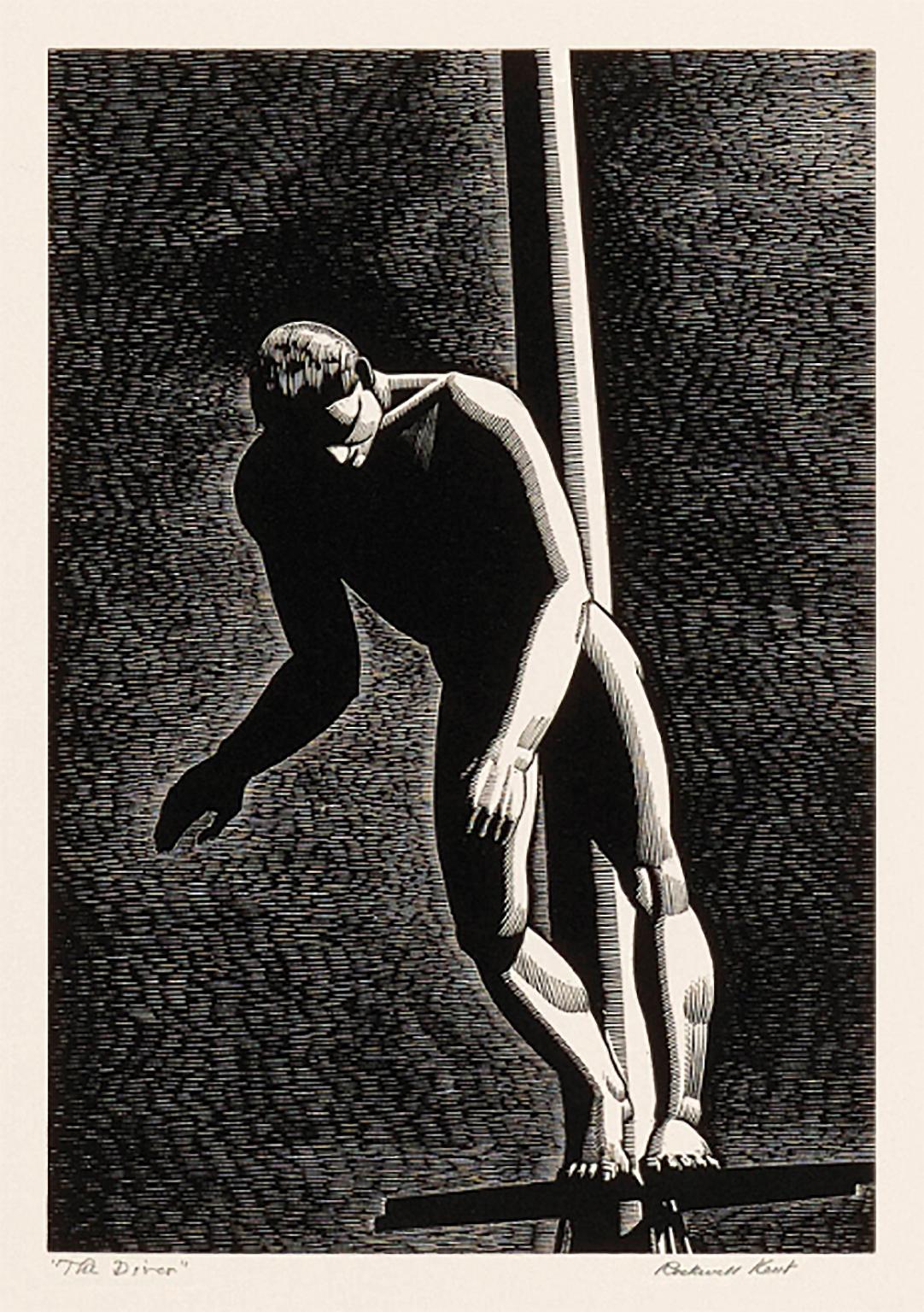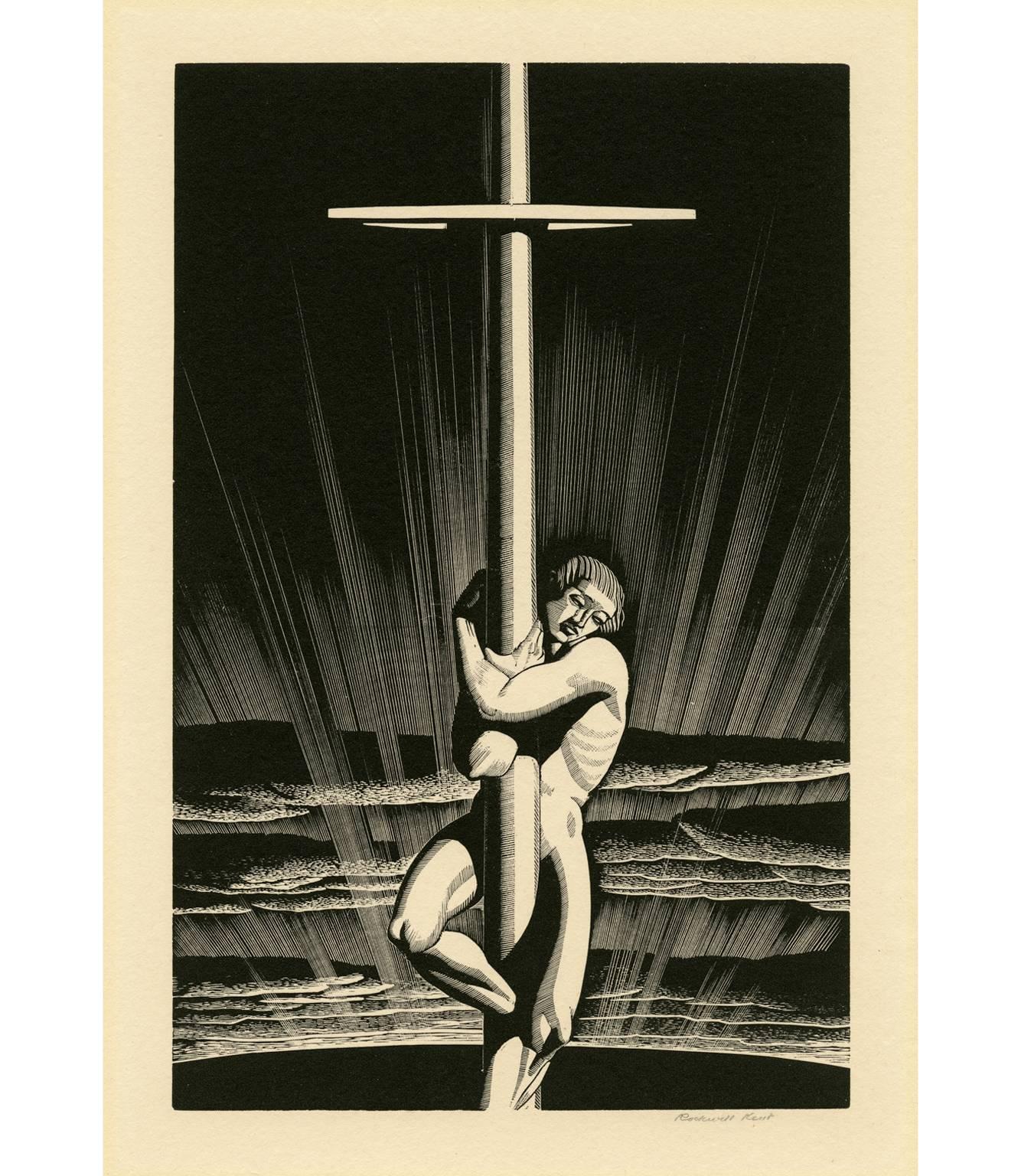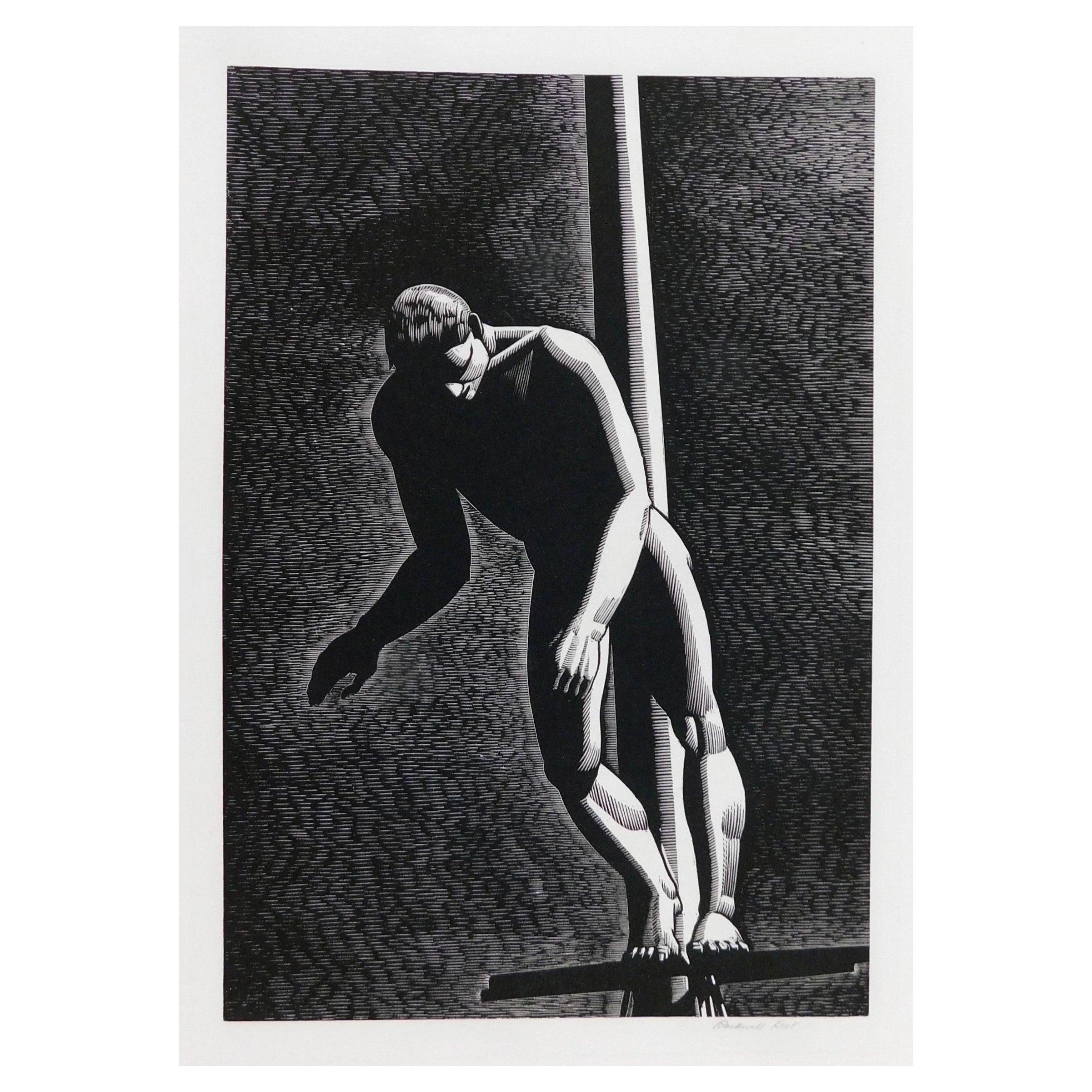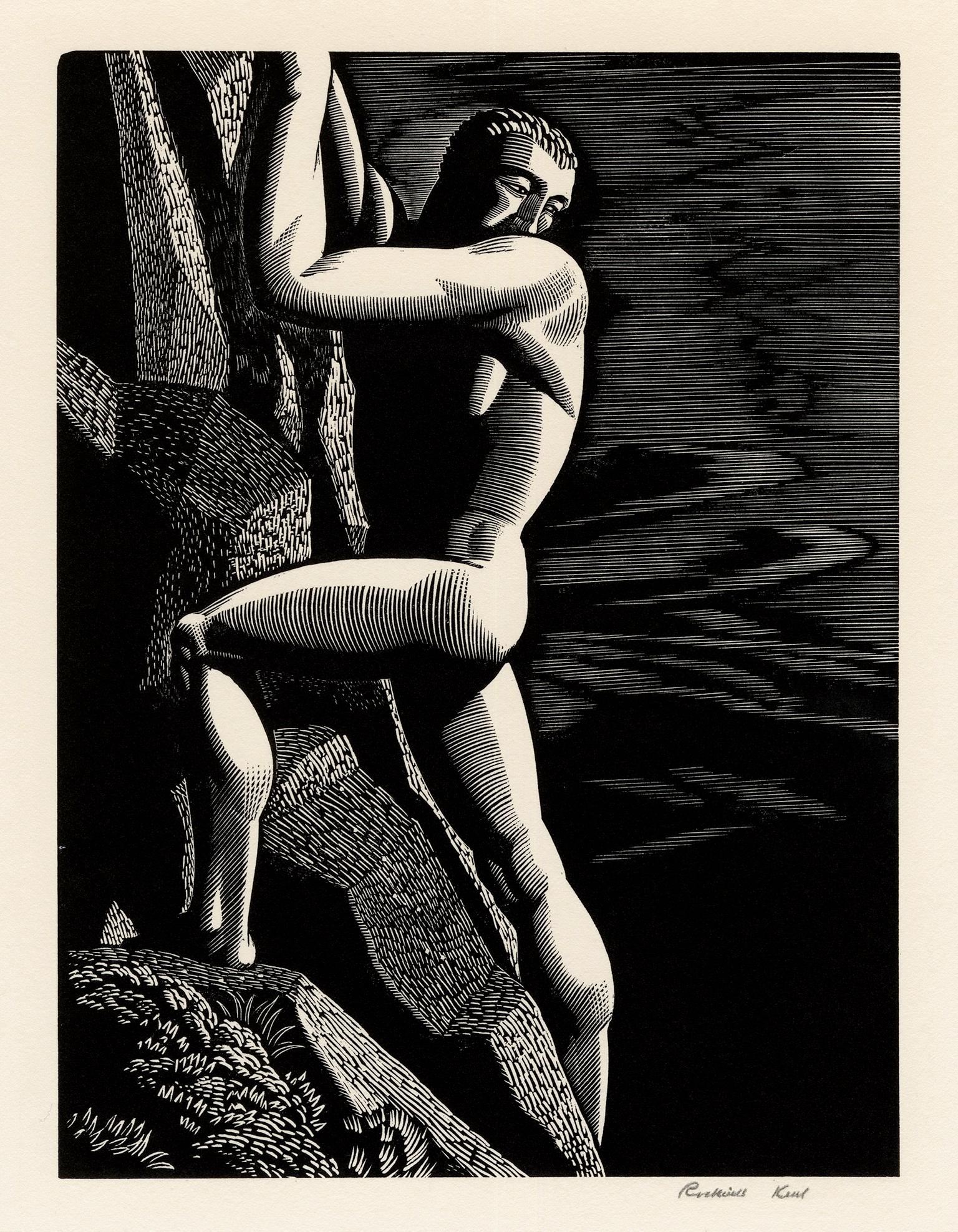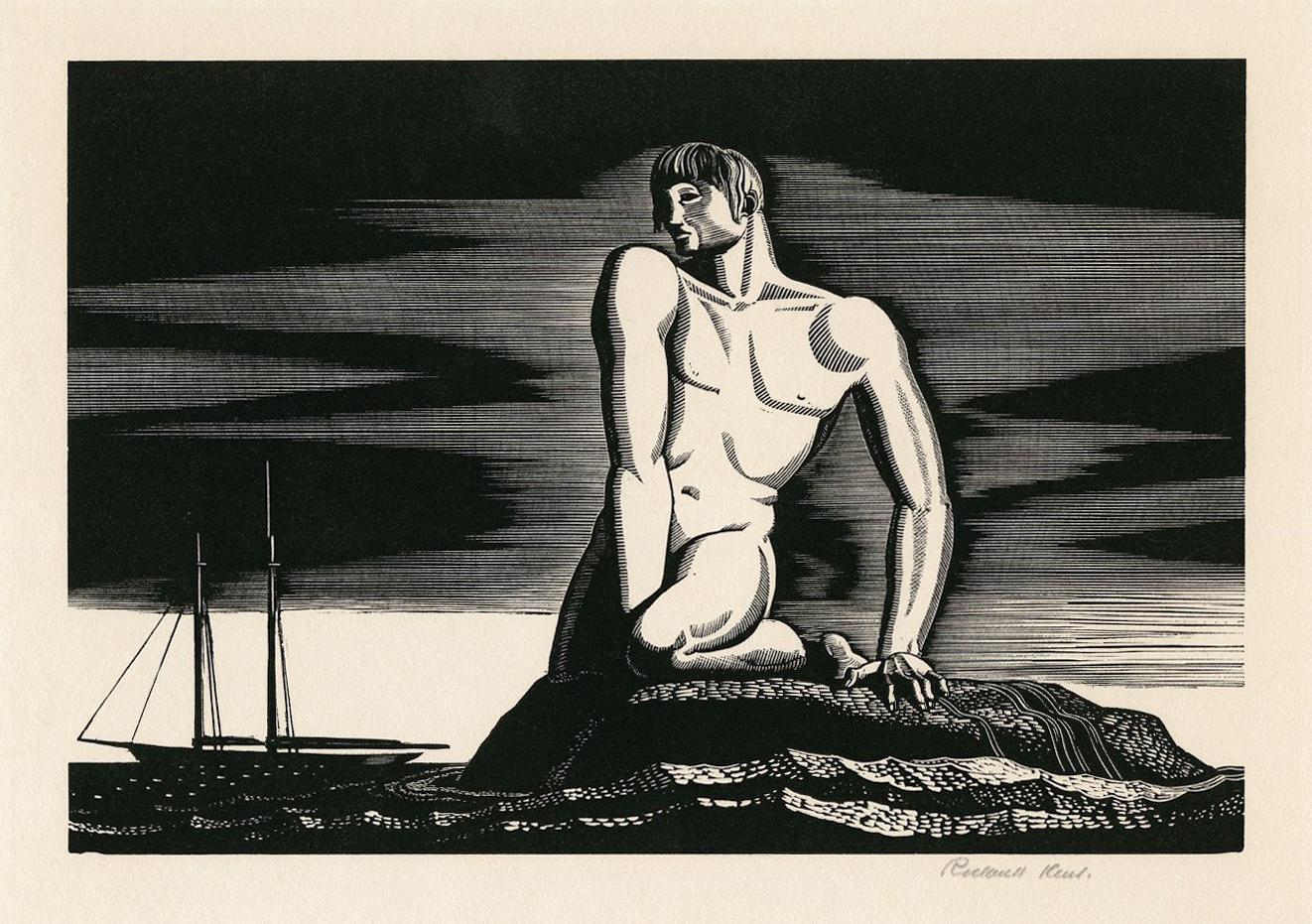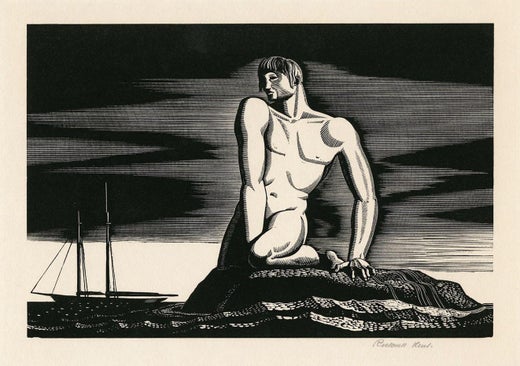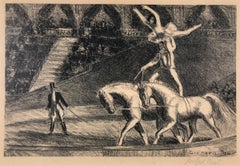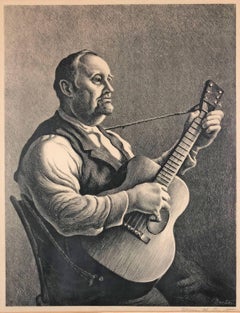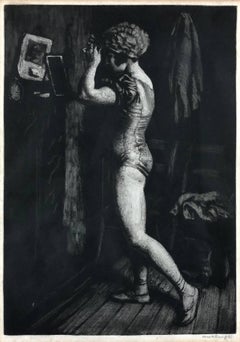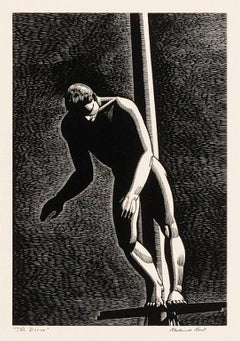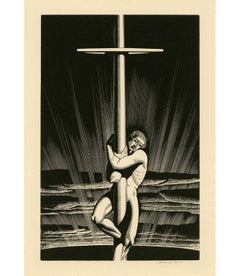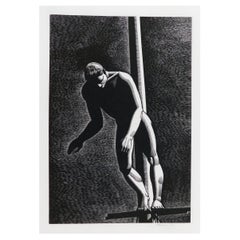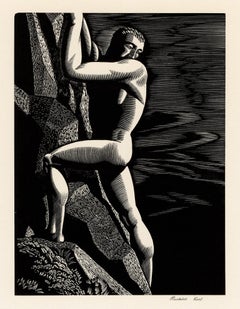Items Similar to Hail and Farewell
Want more images or videos?
Request additional images or videos from the seller
1 of 7
Rockwell KentHail and Farewell1930
1930
Price Upon Request
Price Upon Request
Price Upon Request
Price Upon Request
Price Upon Request
Price Upon Request
Price Upon Request
Price Upon Request
Price Upon Request
Price Upon Request
About the Item
Rockwell Kent
"Hail and Farewell" 1930
Wood Engraving on Paper
Signed in Pencil Lower Right
Sheet Size: 14 3/8 x 11 1/4 in.
Image Size: 8 x 5 1/2 in.
Framed Size: 17.5 x 13.5 in.
Growing up in a genteel family in New York City, Rockwell Kent was a member of the rugged realist school of landscape painters as well as a popular illustrator and printmaker. His 1930 illustrations for Moby Dick are among his most lasting achievements. He was the first American artist to have work exhibited in the Soviet Union, a reflection of his Communist Party sympathies, which earned him the Lenin Peace Prize in 1967. This espousal of radical politics caused his career to suffer badly in the '50s because his leftist views caused him disdain among many Americans. However, his work, reflecting both realism and modernism, has earned increasing attention from American art historians.
His subject matter is wide-ranging including scenes of Maine's Monhegan Island, the Adirondack Mountains, book illustrations, and commercial art renderings for companies including General Electric, Rolls Royce, and Westinghouse. Although his first love was painting, in addition to illustration, he also did fabric, ceramic, and jewelry designs, and spent time as a dairy farmer, carpenter, home builder, and lobster fisherman.
His father, Rockwell Kent, Sr. was a partner in a prominent New York City law firm and an entrepreneur in Central American mining investments. His mother, Sara Ann Holgate, was the niece and surrogate daughter of James and Josephine Banker, one of New York's first-millionaire families. Young Rockwell's early childhood was divided between Hudson River Valley, Long Island, and New York City homes, each brimming with cultured surroundings and distinguished persons. However, that comfortable life came to an abrupt end in 1887 with the death from typhoid fever of Rockwell Kent, Sr., which left the mother with Rockwell Jr., age 5, and another son, and a daughter who was born shortly after the father's death.
Now in a readjusted circumstance of genteel poverty, Kent was encouraged in his art talent by an aunt, Josie Banker who was a successful ceramic decorator and with whom he traveled in Europe. He studied mechanical drawing and woodworking at the Horace Mann School in New York, and this experience gave him a life-long respect for craftsmanship that is evident in his paintings and drawings.
It was also during these years that he developed his understanding of discrepancies between social classes. He later recalled: "When I was a young fellow, I was very much disturbed by seeing some people with lots of money and lots of people with no money" (Smithsonian, 8/2000 by Scott Ferris).
From 1900-1903, he joined William Merritt Chase's classes at Shinnecock and then entered the New York School of Art studying with Robert Henri and becoming close friends with George Bellows and Edward Hopper. His special mentor, however, was Abbott Thayer with whom he painted in New Hampshire and whose home was a place of wide-ranging discussion about topics including German lieder and Nordic sagas. All of this encouraged Kent to travel extensively. Later Kent married Kathleen Whiting, the niece of Thayer, and they had five children. In 1919, after returning from his Alaskan adventure, Kent decided to move his family out of New York City. Searching for a farm they could afford, Kent and Kathleen, found an isolated property high on the southern spur of Mt. Equinox, near Arlington, Vermont. It was called Egypt Farm. But Vermont was not the Eden-like existence he had envisioned and his infidelities and long absences eventually led to divorce. He was married two other times.
He was an inveterate traveler whose wanderlust created subjects from a wide variety of locations and which caused him to be literally the starving artist, dependent upon outside sources for money. One of his supporters was Duncan Phillips, founder of the Phillips Collection in Washington D.C. who for nine years gave Kent $300. a month in exchange for first selection of two paintings a year.
Much influenced in Ireland by Thayer, Kent's artistic focus became landscape painting and the relationship between nature and humanity. He spent much time on Monhegan Island in Maine, a place he first visited in 1905 at the suggestion of Robert Henri. Although Kent stayed only until 1910, the place became closely associated with his name. Between 1915 and 1935, he visited Newfoundland, Alaska, Tierro del Fuego, France, Ireland, and Greenland. He also wrote designed, and illustrated a number of travelogues.
In 1927, after his marriage to Frances Lee, he settled into a parcel of farmland near Ausable Forks, New York, where he built a studio and felt at home for the first time during his painting career. There he and his wife hosted numerous gatherings of prominent New York people including the Pulitzers, Putnams, and Paul Robeson, Pete Seeger, and John Dos Passos.
In 1907, his first exhibition was held in New York, and he also exhibited with George Bellows and John Steuart Curry and members of The Eight before 1920. From 1918, he did numerous wood engravings and lithographs, and he left eighty-six paintings and hundreds of drawings, now scattered among museums. In Fall, 1998, the Monhegan Museum held a retrospective of his oil and ink paintings.
Sources:
Much of the above information is from Scott R. Ferris, specialist in the art of Rockwell Kent. He wrote most of the catalog entry for the Sotheby's auction (12/3/03), for the sale of Blue Day and has written the foreword for the reprinted edition of Kent's book, Salamina (Wesleyan University Press. Oct. 2003). On 25 May 2003, "CBS Sunday Morning" aired an article on Kent, and Ferris was interviewed along with Kent's son Gordon, and artist, Jamie Wyeth.
- Creator:Rockwell Kent (1882-1971, American)
- Creation Year:1930
- Dimensions:Height: 17.5 in (44.45 cm)Width: 13.5 in (34.29 cm)
- Medium:
- Movement & Style:
- Period:
- Condition:
- Gallery Location:Missouri, MO
- Reference Number:1stDibs: LU74735027242
Rockwell Kent
Rockwell Kent, (1882-1971) was born in Plattsburgh, New York). As a painterand printmaker his work was captured scenes of nature and adventure with a sense of drama that made him one of the most popular American artists of the first half of the 20th century. Kent studied architecture at Columbia University but turned to painting and was a pupil of William M. Chase, Robert Henri, and Abbott Thayer. Best known as an artist and illustrator he worked as an architectural draftsman, as a lobsterman and carpenter on the coast of Maine, and as a ship’s carpenter. He explored the waters about Tierra del Fuego in a small boat and lived in Newfoundland, Alaska, and Greenland, drawing heavily upon these experiences for his paintings and travel books. Kent’s human figures, which appear sparingly in his work, often signify mythic themes, such as heroism, loneliness, and individualism.
About the Seller
5.0
Vetted Professional Seller
Every seller passes strict standards for authenticity and reliability
Established in 1970
1stDibs seller since 2017
156 sales on 1stDibs
Typical response time: Several days
- ShippingRetrieving quote...Shipping from: Missouri, MO
- Return Policy
More From This Seller
View AllBareback Act, Old Hippodrome
By Gifford Beal
Located in Missouri, MO
Bareback Act, Old Hippodrome
By Gifford Beal (1879-1956)
Signed Lower Right
Unframed: 6.5" x 9.5"
Framed: 17.5" x 20"
Gifford Beal, painter, etcher, muralist, and teacher, was born in New York City in 1879. The son of landscape painter William Reynolds Beal, Gifford Beal began studying at William Merritt Chase's Shinnecock School of Art (the first established school of plein air painting in America) at the age of thirteen, when he accompanied his older brother, Reynolds, to summer classes. He remained a pupil of Chase's for ten years also studying with him in New York City at the artist's private studio in the Tenth Street Studio Building. Later at his father's behest, he attended Princeton University from 1896 to 1900 while still continuing his lessons with Chase. Upon graduation from Princeton he took classes at the Art Students' League, studying with impressionist landscape painter Henry Ward Ranger and Boston academic painter Frank Vincent DuMond. He ended up as President of the Art Students League for fourteen years, "a distinction unsurpassed by any other artist."
His student days were spent entirely in this country. "Given the opportunity to visit Paris en route to England in 1908, he chose to avoid it" he stated, "I didn't trust myself with the delightful life in ParisIt all sounded so fascinating and easy and loose." His subjects were predominately American, and it has been said stylistically "his art is completely American." Gifford achieved early recognition in the New York Art World.
He became an associate member of the National Academy of Design in 1908 and was elected to full status of academician in 1914. He was known for garden parties, circuses, landscapes, streets, coasts, flowers and marines. This diversity in subject matter created "no typical or characteristic style to his work."
Beal's style was highly influenced by Chase and Childe Hassam, a long time friend of the Beal family who used to travel "about the countryside with Beal in a car sketching...
Category
20th Century American Modern Animal Prints
Materials
Lithograph
Price Upon Request
Bareback Act, Old Hippodrome
By Gifford Beal
Located in Missouri, MO
Gifford Beal (1879-1956)
"Bareback Act, Old Hippodome" 1950
Lithograph
Signed Lower Right
With original Associated American Artists label verso
image: 6 3/8 x 9 5/8 in. (16.2 x 24.6 cm)
sheet: 12 x 16 in. (30.4 x 40.6 cm)
framed: 17 x 20 in.
Gifford Beal, painter, etcher, muralist, and teacher, was born in New York City in 1879. The son of landscape painter William Reynolds Beal, Gifford Beal began studying at William Merritt Chase's Shinnecock School of Art (the first established school of plein air painting in America) at the age of thirteen, when he accompanied his older brother, Reynolds, to summer classes. He remained a pupil of Chase's for ten years also studying with him in New York City at the artist's private studio in the Tenth Street Studio Building. Later at his father's behest, he attended Princeton University from 1896 to 1900 while still continuing his lessons with Chase. Upon graduation from Princeton he took classes at the Art Students' League, studying with impressionist landscape painter Henry Ward Ranger and Boston academic painter Frank Vincent DuMond. He ended up as President of the Art Students League for fourteen years, "a distinction unsurpassed by any other artist."
His student days were spent entirely in this country. "Given the opportunity to visit Paris en route to England in 1908, he chose to avoid it" he stated, "I didn't trust myself with the delightful life in ParisIt all sounded so fascinating and easy and loose." His subjects were predominately American, and it has been said stylistically "his art is completely American." Gifford achieved early recognition in the New York Art World.
He became an associate member of the National Academy of Design in 1908 and was elected to full status of academician in 1914. He was known for garden parties, circuses, landscapes, streets, coasts, flowers and marines. This diversity in subject matter created "no typical or characteristic style to his work."
Beal's style was highly influenced by Chase and Childe Hassam, a long time friend of the Beal family who used to travel "about the countryside with Beal in a car sketching...
Category
1950s American Realist Figurative Prints
Materials
Lithograph
The Hymn Singer
By Thomas Hart Benton
Located in Missouri, MO
Signed in Pencil Lower Right
Ed. 500
Circulated by Twayne Publishers, New York City
Image Size: 16 x 12 3/8
Framed Size: 24 1/4 x 20 1/2 inches
The legendary actor actor and musici...
Category
1950s American Realist Portrait Prints
Materials
Lithograph
Price Upon Request
The Circus Dressing Room
By Dame Laura Knight
Located in Missouri, MO
Dame Laura Knight
"The Circus Dressing Room" 1925
Etching
Ed. 20
Signed Lower Right
Image Size: approx. 14 x 10 inches
Framed Size: approx. 23.5 x 17.75 inches
An English impressio...
Category
1920s Realist Figurative Prints
Materials
Aquatint
Man
By Elizabeth Catlett
Located in Missouri, MO
Elizabeth Catlett
“Man” 1975 (The Print Club of Cleveland Publication Number 83, 2005)
Woodcut and Color Linocut
Printed in 2003 at JK Fine Art Editions Co., Union City, New Jersey
Signed and Dated By The Artist Lower Right
Titled Lower Left
Ed. of 250
Image Size: approx 18 x 12 inches
Elizabeth Catlett (1915-2012) is regarded as one of the most important women artists and African American artists of our time. She believed art could affect social change and that she should be an agent for that change: “I have always wanted my art to service black people—to reflect us, to relate to us, to stimulate us, to make us aware of our potential.” As an artist and an activist, Catlett highlighted the dignity and courage of motherhood, poverty, and the working class, returning again and again to the subject she understood best—African American women.
The work below, entitled, “Man”, is "carved from a block of wood, chiseled like a relief. Catlett, a sculptor as well as a printmaker, carves figures out of wood, and so is extremely familiar with this material. For ‘Man’ she exploits the grain of the wood, allowing to to describe the texture of the skin and form vertical striations, almost scarring the image. Below this intense, three-dimensional visage parades seven boys, printed repetitively from a single linoleum block in a “rainbow roll” that changes from gold to brown. This row of brightly colored figures with bare feet, flat like a string of paper dolls, raise their arms toward the powerful depiction of the troubled man above.”
Biography:
Elizabeth Catlett (1915-2012)
Known for abstract sculpture in bronze and marble as well as prints and paintings, particularly depicting the female figure, Elizabeth Catlett is unique for distilling African American, Native American, and Mexican art in her work. She is "considered by many to be the greatest American black sculptor". . .(Rubinstein 320)
Catlett was born in Washington D.C. and later became a Mexican citizen, residing in Cuernavaca Morelos, Mexico. She spent the last 35 years of her life in Mexico.
Her father, a math teacher at Tuskegee Institute in Alabama, died before she was born, but the family, including her working mother, lived in the relatively commodious home of his family in DC. Catlett received a Bachelor of Arts degree from Howard University, where there was much discussion about whether or not black artists should depict their own heritage or embrace European modernism.
She earned a Master of Fine Arts degree in 1940 from the University of Iowa, where she had gone to study with Grant Wood, Regionalist* painter. His teaching dictum was "paint what you know best," and this advice set her on the path of dealing with her own background. She credits Wood with excellent teaching and deep concern for his students, but she had a problem during that time of taking classes from him because black students were not allowed housing in the University's dormitories.
Following graduation in 1940, she became Chair of the Art Department at Dillard University in New Orleans. There she successfully lobbied for life classes with nude models, and gained museum admission to black students at a local museum that to that point, had banned their entrance. That same year, her painting Mother and Child, depicting African-American figures won her much recognition.
From 1944 to 1946, she taught at the George Washington Carver School, an alternative community school in Harlem that provided instruction for working men and women of the city. From her experiences with these people, she did a series of paintings, prints, and sculptures with the theme "I Am a Negro Woman."
In 1946, she received a Rosenwald Fellowship*, and she and her artist husband, Charles White, traveled to Mexico where she became interested in the Mexican working classes. In 1947, she settled permanently in Mexico where she, divorced from White, married artist Francisco Mora...
Category
Late 19th Century American Modern Figurative Prints
Materials
Linocut, Woodcut
Price Upon Request
The Circus Dressing Room
By Dame Laura Knight
Located in Missouri, MO
Dame Laura Knight (1877-1970)
"The Circus Dressing Room" 1925
Aquatint Engraving
Signed in Pencil Lower Right
Image Size: approx 14 x 9 inches
Framed Size: approx. 23.5 x 18.5 inche...
Category
1920s Realist Figurative Prints
Materials
Engraving, Aquatint
Price Upon Request
You May Also Like
'Diver' — 1930s American Modernism
By Rockwell Kent
Located in Myrtle Beach, SC
Rockwell Kent, 'Diver', wood engraving, 1931, edition 150, Burne Jones 88. Signed, and titled 'The Diver' in pencil.. A brilliant, black impression, on cream, wove Japan paper; the f...
Category
1930s American Modern Nude Prints
Materials
Woodcut
'Sea And Sky' — 1930s Modernism
By Rockwell Kent
Located in Myrtle Beach, SC
Rockwell Kent, 'Sea and Sky', wood engraving, edition 150, 1931 (published 1932). A brilliant, richly-inked impression on cream wove Japan; the full sheet with margins (2 to 2 1/2 in...
Category
1930s American Modern Nude Prints
Materials
Woodcut
Rockwell Kent Original Wood Engraving, 1931 - Diver
By Rockwell Kent
Located in Phoenix, AZ
Rockwell Kent (1882-1971) wood engraving in excellent condition titled: Diver.
Created 1931. Edition size: 150. Image measures: 7 7/8"h x 5 3/8"w.
The print is unframed and presents ...
Category
Mid-20th Century Figurative Prints
Materials
Paper
'Mountain Climber' — American Modernism
By Rockwell Kent
Located in Myrtle Beach, SC
Rockwell Kent, 'Mountain Climber', wood engraving, 1933, edition 250, Burne Jones 93. Signed in pencil. A brilliant, black impression, on cream, wove Japan paper; the full sheet with margins (2 9/16 to 3 5/8 inches); slight skinning at the top sheet edge verso, where previously hinged; otherwise, in excellent condition. Archivally matted to museum standards, unframed.
Image size 7 7/8 x 5 7/8 inches (200 x 149 mm); sheet size 14 x 11 1/8 inches (356 x 283 mm).
Printed by Pynson Printers, New York. Distributed by The Print Club of Cleveland, Publication No. 11, 1933.
Literature: 'Rockwellkentiana,' Harcourt, Brace and Company, New York, 1933. '101 of The World’s Greatest Books', edited by Spencer Armstrong, 1950.
Impressions of this work are held in the following museum collections: Akron Art Institute, Burne Jones Collection, IL; Cincinnati Art Museum; Cleveland Museum of Art; Columbus Gallery of Fine Arts; Crystal Bridges Museum of American Art; Davis Museum at Wellesley College; Fine Art Museums of San Francisco; H. M. de Young Museum; Hermitage Museum; Kent Collection, NY; Library of Congress; Memorial Art Gallery, University of Rochester; Metropolitan Museum of Art; New York Public Library; Philadelphia Museum of Art; Princeton University Library; Smithsonian American Art Museum, Spector Collection, NY; SUNY, Plattsburg.
ABOUT THE ARTIST
Rockwell Kent (1882-1971), though best known as a painter, graphic artist, and illustrator, pursued many careers throughout his life, including architect, carpenter, explorer, writer, dairy farmer, and political activist. Born in Tarrytown, New York, Kent was interested in art from a young age. These ambitions were encouraged by his aunt Jo Holgate, an accomplished ceramicist. Jo came to live with the family after Kent’s father passed away in 1887 and took him to Europe as a teenager, undoubtedly kindling his interest in exploring the world.
Kent attended the Horace Mann School in New York City, where he excelled at mechanical drawing. His family’s financial circumstances prevented him from pursuing a career in the fine arts; however, after graduating from Horace Mann in 1900, Kent decided to study architecture at Columbia University.
Before matriculating at Columbia, Kent spent the first of three consecutive summers studying painting at William Merritt Chase’s art school in Shinnecock Hills, Long Island. There he found a community of mentors and fellow students who encouraged him to pursue his interest in art. At the end of Kent’s third summer at Shinnecock, Chase offered him a full scholarship to the New York School of Art, where he was a teacher. Kent began taking night classes at the art school in addition to his architecture studies but soon left Columbia to study painting full-time. In addition to Chase, Kent took classes with Robert Henri and Kenneth Hayes Miller, where his classmates included the artists George Bellows and Edward Hopper.
Kent spent the summer of 1903 assisting the eccentric painter Abbott Handerson Thayer at his studio in Dublin, New Hampshire—a position he secured through the recommendation of his Aunt Jo. Thayer’s naturalist lifestyle and almost mystical appreciation for natural phenomena greatly influenced Kent; he returned to Dublin for many years to visit Thayer and his family. Thayer gave the young artist time to pursue his work, and that summer Kent painted several views of the New Hampshire landscape, including Mount Monadnock. In 1905 Kent moved from New York to Monhegan Island in Maine, home to a summer art colony, where he continued to find inspiration in nature. Kent soon found success exhibiting and selling his paintings in New York, and in 1907, he was given his first solo show at Claussen Galleries. The following year he married his first wife, Kathleen Whiting (Thayer’s niece), with whom he had five children. The couple divorced in 1924, and Kent married Frances Lee the following year. They divorced after 15 years of marriage, and the artist married Sally Johnstone.
For the next several decades, Kent lived a peripatetic lifestyle, settling in several locations in Connecticut, Maine, and New York. During this time he took several extended voyages to remote, often ice-filled, corners of the globe, including Newfoundland, Alaska, Tierra del Fuego, and Greenland, to which he made three separate trips. For Kent, exploration and artistic production were twinned endeavors, and his travels to these rugged, elemental locations inspired his visual art and his writings. He developed a stark, realist landscape style in his paintings and drawings that revealed both nature’s harshness and its sublimity. Kent’s human figures, which appear sparingly in his work, often allude to the mythic themes of isolation, individualism, heroism, and the quest for self-connection. Important exhibitions of works from these travels include the Knoedler Gallery’s shows in 1919 and 1920, featuring Kent’s Alaska drawings...
Category
1930s American Modern Nude Prints
Materials
Woodcut
A Handsome 1930s Rockwell Kent Lithograph on Paper, Titled "Canterbury Tales"
By Rockwell Kent
Located in Chicago, IL
A handsome 1930s Rockwell Kent lithograph on paper, titled "Canterbury Tales". Nicely matted and framed in a gold-toned frame. Image size: ...
Category
1930s American Modern Figurative Prints
Materials
Paper, Lithograph
'The Bather' — Iconic American Modernism
By Rockwell Kent
Located in Myrtle Beach, SC
Rockwell Kent, 'The Bather', wood engraving, 1931, edition 120, Burne Jones 63. Signed in pencil. A brilliant, black impression, on cream, wove Japan paper; the full sheet with margins (2 1/2 to 3 1/4 inches); slight skinning at the top sheet edge, verso, otherwise in excellent condition. Archivally matted to museum standards, unframed.
Image size 5 3/8 x 7 7/8 inches (137 x 200 mm); sheet size 11 1/8 x 14 1/2 inches (283 x 368 mm).
Impressions of this work are held in the following public collections: Burne Jones Collection (Illinois), Chazen Museum of Art, Chegodaev Collection (Moscow), Kent Collection (New York), National Gallery of Art, Philadelphia Museum of Art; SUNY Plattsburg Art Museum, Princeton University Library, Pushkin Museum (Moscow), Smithsonian American Art Museum, Spector Collection (New York), University of Illinois.
ABOUT THE ARTIST
Rockwell Kent (1882-1971), though best known as a painter, graphic artist, and illustrator, pursued many careers throughout his life, including architect, carpenter, explorer, writer, dairy farmer, and political activist. Born in Tarrytown, New York, Kent was interested in art from a young age. These ambitions were encouraged by his aunt Jo Holgate, an accomplished ceramicist. Jo came to live with the family after Kent’s father passed away in 1887 and took him to Europe as a teenager, undoubtedly kindling his interest in exploring the world.
Kent attended the Horace Mann School in New York City, where he excelled at mechanical drawing. His family’s financial circumstances prevented him from pursuing a career in the fine arts; however, after graduating from Horace Mann in 1900, Kent decided to study architecture at Columbia University.
Before matriculating at Columbia, Kent spent the first of three consecutive summers studying painting at William Merritt Chase’s art school in Shinnecock Hills, Long Island. There he found a community of mentors and fellow students who encouraged him to pursue his interest in art. At the end of Kent’s third summer at Shinnecock, Chase offered him a full scholarship to the New York School of Art, where he was a teacher. Kent began taking night classes at the art school in addition to his architecture studies but soon left Columbia to study painting full-time. In addition to Chase, Kent took classes with Robert Henri and Kenneth Hayes Miller, where his classmates included the artists George Bellows and Edward Hopper.
Kent spent the summer of 1903 assisting the eccentric painter Abbott Handerson Thayer at his studio in Dublin, New Hampshire—a position he secured through the recommendation of his Aunt Jo. Thayer’s naturalist lifestyle and almost mystical appreciation for natural phenomena greatly influenced Kent; he returned to Dublin for many years to visit Thayer and his family. Thayer gave the young artist time to pursue his work, and that summer Kent painted several views of the New Hampshire landscape, including Mount Monadnock...
Category
1930s American Modern Nude Prints
Materials
Woodcut
More Ways To Browse
General Electric Vintage
Hockney Los Angeles Olympics
Hogarth Election
House Of Raquel Vega
Inuit Doll
Iona Rozeal Brown
Iris Woodblock Print
Irving Amen On Sale
Israel Museum Poster
Itzchak Tarkay Afternoon Tea
Itzchak Tarkay Serigraph
Ivory Cigarette Holder
J Alphege Brewer
J Didier
Jack Chandler
James A Pritchard
Jane Rogers
Japanese Warrior Woodblock Print
